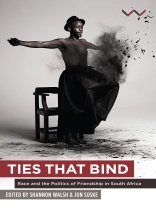What does friendship have to do with racial difference, settler colonialism and post-apartheid South Africa? While histories of apartheid and colonialism in South Africa have often focused on the ideologies of segregation and white supremacy, Ties that Bind explores how the intimacies of friendship create vital spaces for practices of power and resistance. Combining interviews, history, poetry, visual arts, memoir and academic essay, the collection keeps alive the promise of friendship and its possibilities while investigating how affective relations are essential to the social reproduction of power. From the intimacy of personal relationships to the organising ideology of liberal colonial governance, the contributors explore the intersection of race and friendship from a kaleidoscope of viewpoints and scales. Insisting on a timeline that originates in settler colonialism, Ties that Bind uncovers the implication of anti-blackness within nonracialism, and powerfully challenges a simple reading of the Mandela moment and the rainbow nation. In the wake of countrywide student protests calling for decolonisation of the university, and reignited debates around racial inequality, this timely volume insists that the history of South African politics has always already been about friendship. Written in an accessible and engaging style, Ties that Bind will interest a wide audience of scholars, students and activists, as well as general readers curious about contemporary South African debates around race and intimacy.
Tabela de Conteúdo
Chapter 1 Thinking about Race and Friendship in South Africa – Jon Soske and Shannon Walsh
Chapter 2 With Friends like These: The Politics of Friendship in Post-Apartheid South Africa – Sisonke Msimang
Chapter 3 Bound to Violence: Scratching Beginnings and Endings with Lesego Rampolokeng – Stacy Hardy and Lesego Rampolokeng
Chapter 4 Afro-Pessimism and Friendship in South Africa: An Interview with Frank B. Wilderson III – Shannon Walsh
Chapter 5 The Impossible Handshake: The Fault Lines of Friendship in Colonial Natal , 1850–1910 – T. J. Tallie
Chapter 6 The Problem with ‘We’: Affiliation, Political Economy, and the Counterhistory of Nonracialism – Franco Barchiesi
Chapter 7 Affect and the State: Precarious Workers, the Law , and the Promise of Friendship – Bridget Kenny
Chapter 8 ‘A Song of Seeing’: Art and Friendship under Apartheid – Daniel Magaziner
Chapter 9 ‘Friend of the Family’: Maids, Madams, and Domestic Cartographies of Power in South African Art – M. Neelika Jayawardane
Chapter 10 Corner Loving: Ways of Speaking about Love – MADEYOULOOK
Chapter 11 Kutamba Naye: In Search of Anti-Racist and Queer Solidarities – Tsitsi Jaji
Chapter 12 The Native Informant Speaks Back to the Offer of Friendship in White Academia – Mosa Phadi & Nomancotsho Pakade
Sobre o autor
Frank B. Wilderson III is an award-winning writer, activist, and critical theorist who spent five-and-a-half years in South Africa, when he was one of two Americans who held a position as an elected officer in the African National Congress during the country’s transition from apartheid. He worked clandestinely for Umkhonto we Sizwe.












